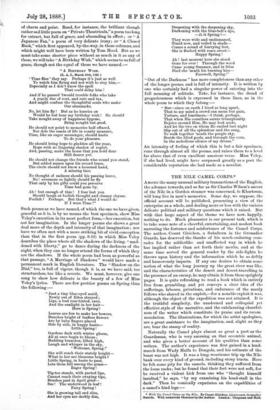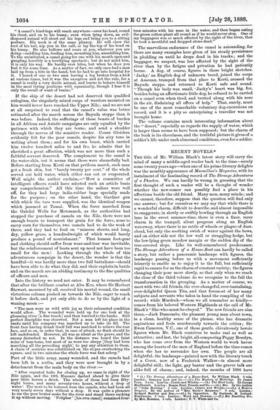THE NILE CAMEL CORPS.* AMONG the many unusual military transactions
of the English, the advance towards, and so far as Sir Charles Wilson's ascent of the Nile in a Gordon steamer was concerned, to Khartoum, will long live in men's memories. Some day, we suppose, the official account will be published, presenting a view of the enterprise as a whole, and dealing more or less with the various delicate political and military questions which it raised. But with that large aspect of the theme we have now, happily, nothing to do. Much pleasanter is our present task, which is to take some note of a cheerful, entertaining, and modest book narrating the fortunes and misfortunes of the Camel Corps. The author, Count Gleichen, a Subaltern in the Grenadier Guards, has deserved the thanks of his much-enduring com- rades for the soldierlike and unaffected way in which he has implied rather than set forth their merits, and at the same time served the general reader by the side-lights he throws upon history and the information which he so deftly and humorously imparts. If any one desires to obtain some notion of what the long journey up the great river was like, and the characteristics of the desert and desert-travelling in the presence of an enemy, he may obtain it from these sprightly pages. It is quite refreshing to read a book which is entirely free from grumbling, and yet conveys a clear idea of the sufferings, labours, privations, and endurance of the manly fellows who shared in the exploit,—for a notable exploit it was, although the object of the expedition was not attained. It is the truthful simplicity, the unadorned and colloquial yet effective style of the narrative, and the exhilarating cheerful- ness of the writer which constitute its praise and its recom mendation. The illustrations, for which the artist apologises,. are a great assistance to the imagination, and, slight as they are, bear the stamp of reality.
Naturally the Camel plays almost as great a part as the Guardsman, who is very amusing on that eccentric animal, and who gives a better account of his qualities than some writers. The author's experience was first gained in a land- march from Wady Haifa to Dongola, and his estimate of the beast was not high. It was a long, wearisome trip up the Nile bank over every kind of ground, including stony tracts. Here he felt some pity for the camels, thinking they suffered from the loose rocks; but he found that their feet were not soft, for he received a violent kick from one who " thought himself insulted," he says, "by my examining his head-stall in the dark." Then he comically expatiates on the capabilities of a camel's hind legs :— • With the Camel Corps up the Nile. By Count Gleiehen, Lieutenant, Grenadier Guards, With numerous Sketcher by the Author. London : Chapman and Hall.
" A camel's hind-legs will reach anywhere—over his head, round his chest, and on to his hump; even when lying down, an evil- disposed animal will shoot out his legs and bring you to a sitting posture. His neck is of the same pliancy. He will chew the root of his tail, nip you in the calf, or lay the top of his head on his hump. He also bellows and roars at you, whatever you are doing—saddling him, feeding him, mounting him, unsaddling him. To the uninitiated, a camel going for one with his mouth open and gurgling horribly is a terrifying spectacle ; but do not mind him, it is only his way. He hardly ever bites, but when he does you feel it for some time. As a matter of fact, we only once had a man laid up frdm a bite in the hand, but he had to go into hospital for it. I heard of one or two men having a leg broken from a kick at various times, but it was the exception and not the rule, for a camel is really a very docile animal, and learns to behave himself in the most trying positions with equanimity, though I fear it is only the result of want of brains."
If the ship of the desert had not deserved this qualified eulogium, the singularly mixed corps of warriors mounted on him would never have reached the Upper Nile ; and we are not at all surprised to read that the camel's value was better estimated after the march across the Bayuda steppe than it was before. Indeed, the sufferings of these beasts of burden in all African and Asiatic campaigns are only equalled by the patience with which they are borne, and send a shudder through the nerves of the sensitive reader. Count Gleichen evidently felt for the poor camels, despite his airy tone in writing about them ; and for his own beast, which carried him twelve hundred miles to and fro, he admits that he cherished a great affection, which was not more than such a faithful servant deserved. The complement to the camel is the water-skin, but it seems that these were shamefully bad. Before starting from Korti on that perilous march, each man got a fresh skin, but "barely twenty per cent." of the whole served out held water, which either ran out or evaporated.
Well might the author exclaim,—"How a committee of intelligent officers could have selected such an article beats my comprehension." All this time the sailors were well off, for they had large india-rubber bags specially made for the purpose ; on the other hand, the Gardner gun with which the tars were supplied, was the identical weapon which jammed at Tamai. When the force marched from the Gakdul Wells for Metemmeh, as the authorities had stopped the purchase of camels on the Nile, there were not enough beasts to transport the grain for the force, none to carry corn for themselves, two camels had to do the work of three, and they had to feed on "mimosa shoots, and long, dry, yellow grass, a hundredweight of which would barely produce a pound of nourishment." That human foot-gear and clothing should suffer from wear-and-tear was inevitable, but the reinforcement of boots sent up need not have been too small for the men ! Looking through the whole of this adventurous campaign in the desert, the wonder is that the handful—it was hardly more than two full battalions—should have been able to do what they did, and their exploits in battle and on the march are an abiding testimony to the fine qualities of officers and men.
Into the history we need not enter. It may be remembered that after the brilliant combat at Abu Kru, where Sir Herbert Stewart, mourned by all, received his mortal wound, the small victorious column pushed on towards the Nile, eager to reach it before dark, and yet only able to do so by the light of a waning moon :-
" The men were as wild with joy as their exhausted condition would allow. The wounded were held up for one look at the gleaming river [a fine touch] and then hurried to the banks. Still perfect discipline was observed. Not a man left his place in the ranks until his company was marched up to take its fill. The front face having drunk itself full was marched to relieve the rear face, and so on, in order that, in case of attack, no flank should be left undefended. However, all was as silent as the grave, and the enemy disturbed us not. In the distance was heard the faint noise of tom-toms, but most of us were too sleepy [they had been marching all the preceding night] to pay any attention to them. A chain of sentries was established on the slopes overlooking the square, and in two minutes the whole force was fast asleep."
Part of the little army, many wounded, and the camels had been left in a zeriba, and they were now brought in by a detachment from the main body on the river :— "After repeated halts for closing up, we came in sight of the Nile again, and the 19th Hussars dashed ahead to give their poor little horses a drink. The whole of them had been fifty- eight hours, and many seventy-two hours, without a drop of water ! The next to be watered were the camels, who had been all very nearly seven days without a drop. It was quite a pleasure to see the poor brutes make for the river and stand there sucking it up without moving. Potiphax ' [his own camel] remained four- teen minutes with his nose in the water, and then began eating the green cotton-plant all round as if he would never stop. One of my baggagers was so much affected by the sight of the river, that he took a mouthful and dropped stone-dead."
The marvellous endurance of the camel is astounding, for there are many examples here given of his steady persistence in plodding on until he drops dead in his tracks ; and the baggager, we suspect, was less affected by the sight of the river than by the fatigue and privation he had patiently borne. A dog, of course, figures in these bright sketches.
' Jacky,' an English dog of unknown breed, joined the corps at Assouan, tramped from that place to Korti, crossed the Bayuda steppe, and returned to Korti safe and sound. " Though his body was small, jacky's ' heart was big, for, besides being an affectionate little dog, he refused to be carried on a camel even when tired, and trotted along with his nose in the air, disdaining all offers of help." That, surely, mast be one of the most remarkable voluntary dog-excursions on record, and it is a pity so enterprising a traveller was not brought home. The volume contains much interesting information about the " desert," especially as regards the supply of water, which is larger than seems to have been supposed ; but the charm of the book is its cheeriness, and the truthful picture it gives of a soldier's life under such abnormal conditions, even for a soldier.



































 Previous page
Previous page